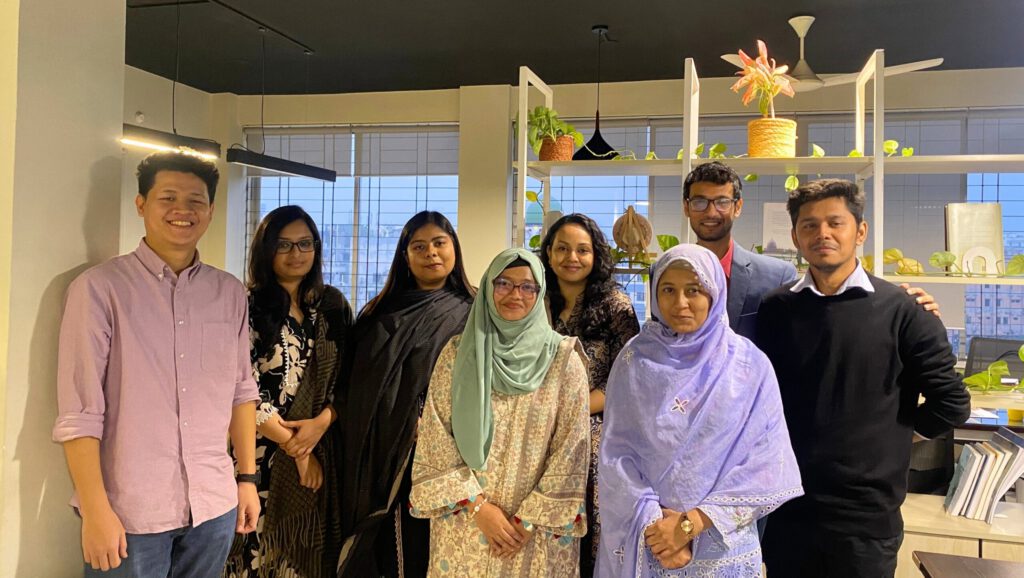Eight young professionals from the fields of law, academia, media, and civil society in Bangladesh have joined Digitally Right’s 2024 Tech Policy Fellowship, embarking on an opportunity to explore the impact of evolving technologies and how the policies that govern these technologies influence their use.
This Fellowship provides the diverse set of fellows a unique opportunity to gain comprehensive insights into global and local trends in technology policies, along with their implications for everyday life, with a focus on challenges such as privacy and personal data protection, online content governance, technology facilitated gender-based violence and equitable internet access. The aim is to develop the next generation of advocates to shape the legal and policy domain in Bangladesh for a more open and free internet space.
The fellowship includes residential training, deep-dive sessions, opportunities to publish research papers on policy issues under expert mentoring, the chance to showcase work to an esteemed audience, and participation in a regional network of tech policy enthusiasts.
Each fellow will pursue research under this fellowship program in the next couple of months and will have the opportunity to share their work with the digital rights community in the region and globally.
Access Now, an international non-profit promoting digital rights worldwide, is a knowledge partner in this fellowship program.
Meet the Fellows
Afrida Samiha Nabilah is a researcher specializing in human rights, gender justice, and social inclusion. As a Research Assistant at BLAST, Afrida has worked on Bangladesh’s Disability Rights and Protection Act and advocated for the rights of religious minorities and gender-diverse groups. She was awarded the Community Equity Fellowship by BLAST, where she conducted in-depth research on the employment rights of plainland indigenous women. Afrida is an active member of the Cyber Support for Women and Children (CSWC), addressing digital rights issues and providing legal aid to victims of violence. Her research interests include the rights of marginalized communities, technology-facilitated gender-based violence, migration, and refugee issues.
Md. Ziaur Rahman Chowdhury is a staff correspondent at The Business Standard with extensive experience reporting on human rights violations, law enforcement affairs, politics, corruption, and crimes. He previously worked for Prothom Alo, Jamuna Television, and The Daily Manabzamin. He received the BRAC-Royal Danish Embassy Migration Media Award in 2020 and recently participated in a three-month ‘Investigative Journalism Fellowship’ organized by the Global Investigative Journalism Network (GIJN). Over the years, he has also worked with international media outlets, including Agence France-Presse (AFP), France24, the Financial Times, and Delayed Gratification magazine.
Mehedi Hasan Marof is an investigative journalist with Netra News, based in Dhaka, Bangladesh. He also reports independently for international outlets like Al Jazeera, NBC News, and Dialogue Earth. His coverage of Bangladesh’s “July Uprising” earned him acclaim from academics, fellow journalists, and the public alike. Alongside his reporting, he occasionally lectures at journalism schools. His primary areas of focus include criminal justice, security force misconduct, political corruption, climate change, and OSINT.
Nabangsu Chakma is a law graduate from the University of Dhaka, Bangladesh. He is currently an independent researcher focusing on the human rights of the Indigenous peoples. His interests lie at the intersection of law, human rights and technology.
Nazifa Muniyat Quader, Lecturer of Canadian University of Bangladesh and a Legal Advisor to a climate-tech startup, is an accomplished Academic and legal professional with experiences in legal practice and development sector. She previously worked at the United Nations Office of Drugs and Crime (UNODC) as a team member on the GLO.ACT project. Additionally, she serves as an adjudicator in National and International Moot Court Competitions. Her research interests lie in – international diplomacy, intellectual property, humanitarian law, refugee law, and personal laws.
Saraban Tahura Zaman, a human rights lawyer, consultant, and feminist activist from Bangladesh, works as a Consultant for Global Advocacy at the Center for Reproductive Rights. A diploma holder in Leadership from the Swedish Institute in 2018, she led the SheDecides movement in Bangladesh and curated a global exhibition commemorating the 25th anniversary of the Beijing Declaration. She was also a core member of the Drafting Committee for the Transgender Protection Bill. As a policy analyst, she has contributed to the review of key laws and policies, including the Child Marriage Restraint Act, Anti- Discrimination Law, and ICT Act. Additionally, Ms. Zaman is the founder of Justicia Feminist Network, the first legal network of feminist lawyers in Bangladesh, dedicated to advancing a more gender-just society.
Sazia Sharmin is a development professional and social science researcher focused on bridging the digital divide and ensuring equitable access to information. Getting the right information to those who need it most has been central to her work with local and global development organizations, as well as her role as a fact-checker and deputy editor at FactWatch. Through this fellowship, she aims to advocate for technology policies that prioritize the voices and needs of systemically excluded communities.
Tabassum Nuha, Lecturer in the Department of Mass Communication and Journalism at Bangladesh University of Professionals (BUP), is affiliated with the Society for Environment and Human Development (SEHD) and the Bratyajan Research Center (BRC). She previously served as a researcher at the Liberation War Museum. Her academic research interests include digital media communication, information disorder, and cultural studies.


